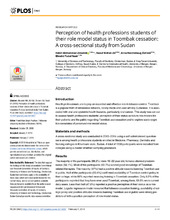| dc.contributor.author | Almahdi, Hatim Mohammed | en_US |
| dc.contributor.author | Ali, Rouf | en_US |
| dc.contributor.author | Åstrøm, Anne Nordrehaug | en_US |
| dc.contributor.author | Nasir, Elwalid Fadul | en_US |
| dc.date.accessioned | 2020-08-07T12:59:35Z | |
| dc.date.available | 2020-08-07T12:59:35Z | |
| dc.date.issued | 2019 | |
| dc.Published | Almahdi HM, Ali R, Åstrøm AN, Nasir EF. Perception of Health professions students of their role model status in Tombak cessation: A cross sectional study from Sudan. PLOS ONE. 2019;14(2):e0210837 | eng |
| dc.identifier.issn | 1932-6203 | |
| dc.identifier.uri | https://hdl.handle.net/1956/23576 | |
| dc.description.abstract | Introduction: Health professionals are to play an essential and effective role in tobacco control. Toombak is a popular form of smokeless tobacco, locally made and used among Sudanese. It is associated with oral and systemic health hazards, particularly oral cancer. This study was set out to assess health professions students’ perception of their status as future role models for their patients and the public regarding Toombak use cessation and to explore socio-cognitive covariates of perceived role model status. Materials and methods: A cross-sectional study was conducted in 2013–2014 using a self-administered questionnaire among health professions students enrolled in Medicine, Pharmacy, Dentistry and Nursing colleges in Khartoum state, Sudan. A total of 1530 participants were recruited from colleges using a cluster stratified sampling procedure. Results: The majority of the participants (88.2%) were 19–22 year old, females showed predominance (66.1%). Most of the participants (69.7%) scored good knowledge of Toombak-related therapies. The majority (97%) had a positive attitude towards banning Toombak use in public. Half of the participants (50.4%) confirmed availability of Toombak control policy in their college, while 66% reported receiving training in Toombak cessation. Only 9.2% of the participants reported that they have ever used Toombak; among them, 69.5% were current daily users. Less than half (47.8%) reported a positive perception of their status as a role model. Logistic regression model revealed that tobacco cessation training, availability of college policy and positive attitudes towards banning Toombak use in public were strong predictors of with a positive perception of role model status. Conclusion: Imposing Toombak control policies within colleges combined with formal training in cessation methods, would reinforce the positive perception of health professions students as a role model, particularly the students themselves seem to be ready for such systematic training. | en_US |
| dc.language.iso | eng | eng |
| dc.publisher | PLOS | eng |
| dc.rights | Attribution CC BY | eng |
| dc.rights.uri | http://creativecommons.org/licenses/by/4.0 | eng |
| dc.title | Perception of Health professions students of their role model status in Tombak cessation: A cross sectional study from Sudan | en_US |
| dc.type | Peer reviewed | |
| dc.type | Journal article | |
| dc.date.updated | 2019-11-11T09:40:14Z | |
| dc.description.version | publishedVersion | en_US |
| dc.rights.holder | Copyright 2019 The Author(s) | |
| dc.identifier.doi | https://doi.org/10.1371/journal.pone.0210837 | |
| dc.identifier.cristin | 1727921 | |
| dc.source.journal | PLoS ONE | |

